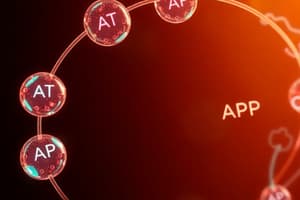Podcast
Questions and Answers
Which one of the following best defines metabolism?
Which one of the following best defines metabolism?
- The process of building new molecules from smaller units
- The process of maintaining a stable internal environment
- The process of eliminating waste from the body
- The process of breaking down food into energy (correct)
Which one of the following terms is used to describe a reaction that releases energy?
Which one of the following terms is used to describe a reaction that releases energy?
- Entropy
- Exergonic (correct)
- Enthalpy
- Endergonic
What is the role of ATP in the transfer of free energy from exergonic reactions?
What is the role of ATP in the transfer of free energy from exergonic reactions?
- ATP provides the energy needed for exergonic reactions (correct)
- ATP stores excess energy from exergonic reactions
- ATP inhibits the transfer of free energy
- ATP converts exergonic reactions into endergonic reactions
Which field of study focuses on the energy changes accompanying biochemical reactions?
Which field of study focuses on the energy changes accompanying biochemical reactions?
What is the form in which energy is most often liberated in biochemical reactions?
What is the form in which energy is most often liberated in biochemical reactions?
Which laws do biological energy transformations obey?
Which laws do biological energy transformations obey?
Which fundamental law of thermodynamics states the principle of conservation of energy?
Which fundamental law of thermodynamics states the principle of conservation of energy?
Which type of system includes everything within a defined region of space?
Which type of system includes everything within a defined region of space?
Flashcards are hidden until you start studying
Study Notes
Metabolism
- The sum of all chemical reactions that occur within a living organism.
Exergonic Reactions
- Reactions that release energy.
ATP's Role in Energy Transfer
- ATP acts as an energy carrier, transferring the energy released from exergonic reactions to drive endergonic reactions.
Biochemical Thermodynamics
- The study of energy changes accompanying biochemical reactions.
Energy Liberation in Biochemical Reactions
- Most often liberated in the form of heat.
Laws Governing Biological Energy Transformations
- Biological energy transformations obey the laws of thermodynamics.
First Law of Thermodynamics
- States the principle of conservation of energy, meaning energy can neither be created nor destroyed but can be transferred from one form to another.
Closed System
- Includes everything within a defined region of space, and there is no exchange of energy or matter with its surroundings.
Studying That Suits You
Use AI to generate personalized quizzes and flashcards to suit your learning preferences.



